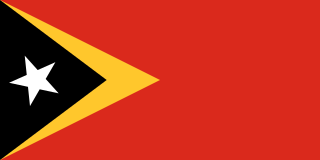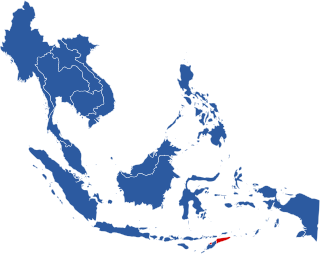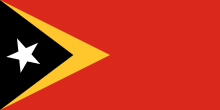
Dili is the capital and largest city of East Timor. It lies on the northern coast of the island of Timor, in a small area of flat land hemmed in by mountains. The climate is tropical, with distinct wet and dry seasons. The city has served as the economic hub and chief port of what is now East Timor since its designation as the capital of Portuguese Timor in 1769. It also serves as the capital of the Dili Municipality, which includes some rural subdivisions in addition to the urban ones that make up the city itself. Dili's growing population is relatively youthful, being mostly of working age. The local language is Tetum; however, residents include many internal migrants from other areas of the country.

The political system in Timor-Leste is a unitary semi-presidential representative democratic republic, whereby the Prime Minister of Timor-Leste is the head of government and the President of Timor-Leste functions as head of state. Timor-Leste has a multi-party system. Executive power is exercised by the president and the government. Legislative power is vested in both the government and the National Parliament. The Judiciary is independent of the executive and the legislature. The East Timorese constitution was modelled on that of Portugal, with lesser power given to the president. The country is still in the process of building its administration and governmental institutions. The Economist Intelligence Unit rated East Timor a "flawed democracy" in 2022.

The economy of Timor-Leste is a low-income economy as ranked by the World Bank. It is placed 140th on the Human Development Index, indicating a medium level of human development. 20% of the population is unemployed, and 52.9% live on less than $1.25 a day. About half of the population is illiterate. At 27%, Timor-Leste's urbanisation rate is one of the lowest in the world.

In Timor-Leste, transportation is reduced due to the nation's poverty, poor transportation infrastructure.

After the referendum on independence on 30 August 1999, Timor-Leste became an independent nation on 20 May 2002 and began initiating diplomatic relations with the rest of the global community.

The Timor-Leste national football team, recognized as Timor-Leste by FIFA, is the national team of Timor-Leste and is controlled by the Federação de Futebol de Timor-Leste (FFTL). They became a member of FIFA on 12 September 2005.

The União Nacional dos Escuteiros de Timor-Leste is the national Scouting organization of East Timor. It was founded on December 2, 2005 through the merger of the Corpo de Escuteiros Católicos em Timor-Leste and of Timor-Leste Scouting. The organization is a member of the Comunidade do Escutismo Lusófono. It became a member of the World Organization of the Scout Movement on 22 June 2017.

The National Stadium of Timor-Leste, also known as the Municipal Stadium of Dili, is a multi-purpose stadium in Dili, Timor-Leste.

Wetar Strait is an international strait in Southeast Asia. It separates the island of Wetar from the eastern part of the island of Timor. The strait is also the eastern portion of a pair of international straits, the other one being Ombai Strait; the two straits combine to link the Indian Ocean with the Pacific Ocean.
The aquatics events at the 2007 SEA Games included swimming, diving and water polo. The events were held at the Aquatic Center, His Majesty the King's 80th Birthday Anniversary Stadium, Nakhon Ratchasima, Thailand.

The majority of the population of Timor-Leste is Christian, and the Catholic Church is the dominant religious institution, although it is not formally the state religion. There are also small Protestant and Sunni Muslim communities.

Timor-Leste, also known as East Timor, officially the Democratic Republic of Timor-Leste, is a country in Southeast Asia. It comprises the eastern half of the island of Timor, the coastal exclave of Oecusse in the island's northwest, and the minor islands of Atauro and Jaco. Australia is the country's southern neighbour, separated by the Timor Sea. The country's size is 14,950 square kilometres (5,770 sq mi). Dili, on the north coast of Timor, is its capital and largest city.

The accession of Timor-Leste to the Association of Southeast Asian Nations is a process that started following the independence of the country in 2002 when its leaders stated that it had made a "strategic decision" to become a member state of the Association of Southeast Asian Nations (ASEAN) in the future. The country officially applied for membership in 2011.
This article details the match results and statistics of the Timor-Leste national football team.

The 17th FINA World Championships were held in Budapest, Hungary from 14 to 30 July 2017.

The 2019 World Aquatics Championships were the 18th FINA World Aquatics Championships, held in Gwangju, South Korea from 12 to 28 July 2019. The city had previously hosted the 2015 Summer Universiade aquatics events in the same venues.
Swimming at the 2018 Asian Games was held at the Gelora Bung Karno Aquatic Stadium in Gelora Bung Karno Sports Complex, Jakarta, Indonesia, from 19 to 24 August 2018.
The Timor-Leste–Indonesia–Australia Growth Triangle (TIA-GT) is a combined initiative of the regions of Eastern Indonesia, Northern Australia, and the Democratic Republic of Timor-Leste. This initiative aims to promote and foster economic growth through integrated economic development in the region that these nations reside in. The growth triangle was created in 2012, after a meeting was held by Indonesian president Susilo Bambang Yudhoyono with Prime Minister of Australia Julia Gillard and Timor-Leste Prime Minister Xanana Gusmao. The initiative aims to support economic, social, and cultural development primarily by attracting investment, developing manufacturing industries, enhancing human capital, and overall building a stronger cooperative relationship between the three countries involved. The initiative also aimed to accelerate the accession of Timor-Leste into the Association of Southeast Asian Nations (ASEAN) and to fulfill goals set by Timor-Leste's Strategic Development Plan, such as increasing the nation's economic prosperity and stability. The growth triangle is often misinterpreted as a free-trade zone; however, while there are elements of free trade agreements between Indonesia and Australia specifically, the terms of the growth triangle initiative are not directly linked to these free trade agreements, and the goals of the growth triangle do not specifically encompass free trade between the three nations.
The COVID-19 pandemic in Timor-Leste was part of the worldwide pandemic of coronavirus disease 2019 caused by severe acute respiratory syndrome coronavirus 2. The virus was confirmed to have reached Timor-Leste in March 2020.













